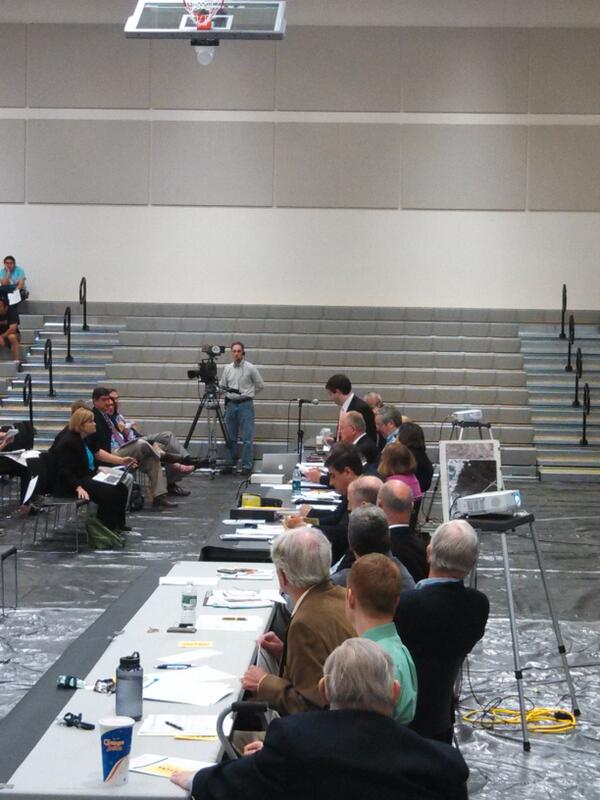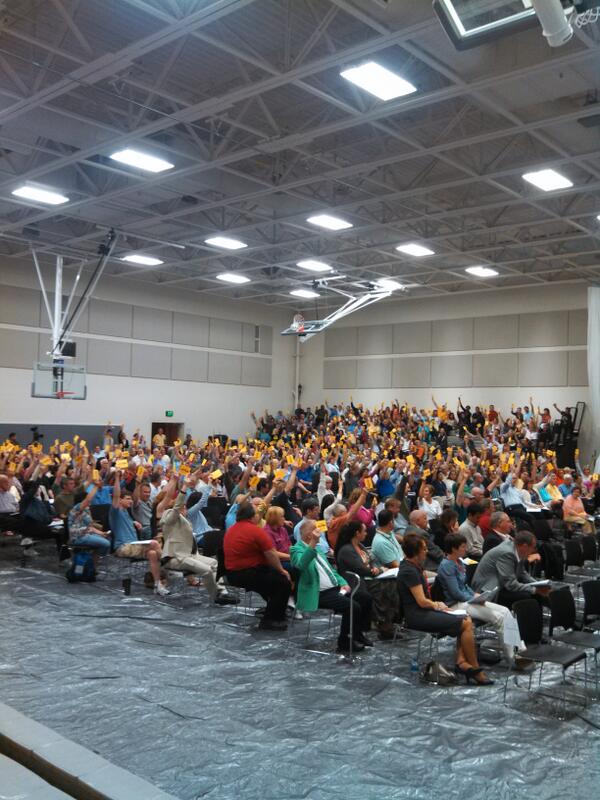Longmeadow Daze: House of Clark’s…
Longmeadow Daze is an occasional series reporting on and analyzing Longmeadow government and politics.

Clark and the School Committee Prevailed (Image created via House of Cards promotional material & Longmeadow Schools)
LONGMEADOW—By a huge majority, voters at the annual town meeting decided to restore hundred of thousands of dollars in school funding. The town meeting, functioning as the town’s legislature approved the annual budget in addition to numerous other items that needed approval from voters.
The showdown had been precipitated by a decision by the Select Board to cut $700,000 out of the School Budget after the town’s School Committee already passed its budget. The Board’s ostensible reason for this was to begin address the town’s multimillion dollar infrastructure backlog.

The Town Meeting in the new High School Gym (WMassP&I)
Town meeting is both a throwback to New England’s early history and, arguably, one of the few true exercises direct democracy in the world. Town meetings are common throughout New England although many Massachusetts towns, like Ludlow, have a representative town meeting that is elected.
The main event was undoubtedly the school budget. Town meeting items are divided up into warrants and the budget was spread across Warrants VI and VIII, although the actual spending plan was only in VI. The Longmeadow School Committee, led by its chair, Michael Clark, presented an amendment to Article VI that would enact the compromise the Committee and Select Board had fashioned, but the latter body ultimately rejected.

Clark (standing) making the motion to transfer funding for schools (WMassP&I)
Clark had not only the fate of the school system and numerous program cuts to consider. Hanging in the balance was the political career he had studiously crafted in one of Greater Springfield’s most affluent and influential communities. A loss or even a narrower than expected win could cost him politically.
After navigating the temporary footpaths surrounding the new high school only opened a few months before, voters filed into the gymnasium, which itself awaited some finishing touches. Gaveled into session by Town Moderator Michael Kallock, the meeting began after a moment of silence dedicated to the Boston Marathon bombing victims.
After a series of housekeeping, nominations and a drainage warrant, the battle began on Warrant VI. The budgetary situation was described by town officials, including the new Town Manager, Stephen Crane, and members of the Select Board. Emphasis was put on the state of the town’s roads, buildings and water/sewer lines, an obvious wink at the Board’s justification for the schools cut.
Also lurking in the room, albeit unseen, was the Massachusetts Legislature, which has been famously stingy restoring cuts to local aide. While Longmeadow, due to its high property values and minimal poverty, get less proportionately than its urban neighbor to the north, the town, too, has suffered mightily from a lack of funding from Boston. Numerous references were made to the meager growth in state aide to the town.
Elections, too, were afoot, as Select Board Candidate Alex Grant took the microphone many times to ask questions and challenge the Board’s claims. Board members Mark Gold, who supported the compromise with the School Committee, and Mark Barowsky, who did not, are up for reelection this year.

Longmeadow Superintendent Marie Doyle (via Longmeadow Schools)
Clark formally offered the amendment to the budget, but left it to School Superintendent Marie Doyle to outline the risk of rejecting the $350,000+ increase in school funding. At particular risk were teacher layoffs and gutting the elementary school music program, the latter of which would be a defining feature of the pro-amendment side’s arguments.
The Committee also defended its budget, which the Board had argued was unable to survive at level funding. Speakers noted that teachers received their first raise in three years, which the crowd, judging by the agreeable murmuring, felt was fair.
In an interview the next day, Clark acknowledged the town’s needs saying, “The School Committee is acutely aware of the full needs of the town.” “We do not exist in a vacuum,” he added, but that among the services town residents demand are good schools.
Board member Richard Foster reiterated the town’s infrastructure backlog and suggested the schools address waste. He was partly refuted by Grant, who noted that the last town manager said the town has no true capital plan. Grant also pointed out, parrying implied charges of waste within the schools, that capital projects, including one ongoing in the town, can be just as wasteful.

Longmeadow voters overwhelming raise their yellow voting cards to approve transfer to the schools (WMassP&I)
But the steady stream of supporters from the town meeting itself was a sign of where the meeting was going. Most highlighted the impact on the music program. One woman warned her fellow residents not to make this a night of “tragic irony” as a Longmeadow music teacher that inspired her was being honored at a dinner in Holyoke that very night.
A student also approached the microphone to defend the program, but was nearly shut down by a woman who made a point of order that only voters could speak. Kallock nevertheless allowed her to speak. Another speaker acknowledged the need for considering other town needs, “the town built the schools,” he said. But that did not mean the schools could be shortchanged.
When the vote finally came up, the result was somewhat anti-climactic. The residents overwhelming backed the transfer, restoring $300,000+ to the schools and avoiding dramatic cuts.
What actually added a bit of suspense were an amendment and then a secondary amendment to that amendment to add more money to the school budget. Clark demurred at the proposals which would have added another $300,000 and $2.5 million respectively. He noted that unlike the compromise that had just been approved, these items had no identified funding source. The amendments were defeated and then the budget as a whole approved. From there the Meeting proceeded to other items.
Clark said he was not surprised at the outcome, “We did a really great job of organizing.”
In the weeks since the last attempt at compromise with the committee failed, Clark and his Committee colleagues had been rallying the base in person and on social media, who apparently turned out in force. But as Clark himself acknowledged, he was on point in this particular, if not terribly uncommon fight in Longmeadow.
“This my first time taking the bull by the horns and getting it accomplished,” he said. “I do feel validated.”
Politically speaking, for Clark, betting on schools is of course a winner in general, and the town has already proven itself willing to make such investments despite the cost. The bond for the new school in which the town meeting was held is only further evidence.
Still, the School Committee, a fairly collegial and agreeable group, offers few opportunities for political coups like the one Clark executed, even if with a little help form his friends.

Longmeadow Town Hall (via wikipedia)
Longmeadow still needs to confront its crumbling infrastructure. A major cut to schools however for a pittance of infrastructure appears not to be answer.
Several speakers said that the town only superficially appears to have deep pockets and therefore an override of Proposition 2 ½ would be a hit many homeowners could not sustain. Whether that is true or not, Longmeadow has that option and is capable of surviving it in a way that Springfield to its north cannot do and could not sustain.
Override or no, Proposition 2 ½ represents a stumbling block for the town’s capacity to address its issues. The solution ultimately will have to come from Boston, it seems, either in the form of aide directly to the projects on Longmeadow’s shelf or in general aide. Unfortunately Beacon Hill has been only marginally willing to raise the revenue to address the billions in infrastructure needs across the commonwealth.
